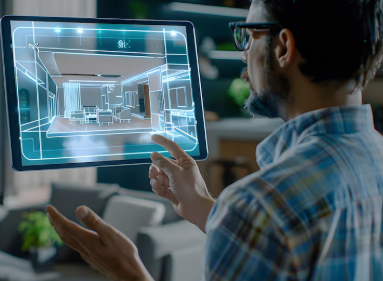As the digital revolution reshapes industries, healthcare is evolving with it—driven by powerful innovations like the metaverse. This immersive virtual space is emerging as a key enabler of the next era in digital healthcare, from remote consultations to collaborative surgeries. Supporting this shift requires a robust foundation built on advanced IT services partnerships such as STL Digital and expert-led IT consulting, that ensure secure, scalable infrastructure tailored for healthcare’s unique needs.
As virtual health experiences become mainstream, the convergence of AI, cloud, and immersive technology is forming a strong foundation for intelligent and accessible care. This is where organizations need to plan their digital roadmap—not just to enhance operations, but to reinvent the patient experience.
A Digital Health Boom
According to Statista, there were more than 1.3 billion users of digital health services in 2024, with that number expected to climb to 1.77 billion by 2029. This exponential growth highlights an evolving patient base—one that is digital-first and increasingly open to digital healthcare models powered by cloud services and AI.
Such growth necessitates the adoption of flexible, scalable, and intelligent IT solutions to meet the increasing demands of patients and providers alike. From cloud-hosted EHR systems to AI-driven analytics, digital healthcare is becoming the new norm.
The Metaverse Surge
A report by Gartner predicts that by 2026, 25% of people will spend at least one hour per day in the metaverse, engaging in activities spanning work, shopping, socializing, and even healthcare. This will require a strong digital infrastructure, underpinned by IT services and cloud solutions.
As healthcare shifts to digital-first engagement models, organizations will need to deliver care in new formats, including virtual clinics, 3D learning environments, and immersive telemedicine consultations. The metaverse will also provide platforms for remote diagnostics, virtual rehabilitation, and digital therapeutics.
And it’s not just speculative. As Bain & Company reports, the metaverse could become a $900 billion market by 2030. For digital healthcare providers, this opens up a new arena for innovation and patient engagement.
Metaverse in Healthcare: Opportunities & Impact
Whether it’s delivering virtual consultations or immersive mental health treatments, the metaverse is rapidly becoming a core enabler in digital healthcare. However, realizing its full potential depends on robust IT services, advanced IT consulting, and reliable cloud services.
Cloud solutions ensure that data-intensive experiences are smooth, secure, and scalable, offering the agility that healthcare organizations need to navigate this digital shift. These capabilities also support interoperability across various platforms and systems—a necessity in integrated, patient-centered virtual environments.
Virtual Reality in Healthcare
VR tools powered by IT services are now being used to treat PTSD, manage pain, and aid in rehabilitation—enhancing digital healthcare delivery through immersive experiences.
VR also provides exposure therapy for phobias and anxiety, distraction therapy for pediatric patients, and simulation-based medical education. Virtual physical therapy can also increase adherence and outcomes by guiding patients through exercises in engaging digital environments. VR tools powered by IT services are now being used to treat PTSD, manage pain, and aid in rehabilitation, enhancing Digital Healthcare delivery through immersive experiences.
Augmented Reality in Medical Training
AR in the metaverse enhances medical training, making learning more dynamic and data-driven. Backed by strong cloud solutions, AR training can be accessed from anywhere securely.
It enables layered learning, allowing students to interact with 3D anatomy models, simulate complex surgeries, and collaborate with peers remotely. Augmented Reality also plays a key role in real-time guidance during live surgeries, enhancing precision and reducing error rates. AR in the metaverse enhances medical training, making learning more dynamic and data-driven. Backed by strong cloud solutions, AR training can be accessed from anywhere securely.
Remote Patient Monitoring
Remote patient monitoring technologies supported by IT consulting and cloud services allow real-time health tracking, reducing the need for in-person visits while improving care outcomes.
These solutions track chronic conditions, detect anomalies, and alert healthcare providers instantly. Integration with Data Analytics & AI can enhance predictive insights, while user-friendly interfaces in the metaverse improve patient engagement and understanding. Remote patient monitoring technologies supported by IT consulting and cloud services allow real-time health tracking, reducing the need for in-person visits while improving care outcomes.
Digital Twin Technology in Medicine
Digital twins, used to model and predict health scenarios, rely heavily on integrated cloud solutions and data analytics supported by IT services.
They provide a safe, virtual space to test treatment plans and simulate surgeries without risk to actual patients. Personalized twins can reflect individual physiological responses, enabling truly tailored healthcare interventions. Digital twins, used to model and predict health scenarios, rely heavily on integrated cloud solutions and data analytics supported by IT services.
Telehealth & Telemedicine Integration
As telehealth evolves into immersive metaverse environments, IT consulting will play a vital role in ensuring platforms are secure, scalable, and interoperable.
Telemedicine in the metaverse can replicate the in-clinic experience, allowing real-time consultations with avatars, AI triaging, and digital prescription services. Cloud-integrated solutions ensure seamless data flow between providers and patients. As telehealth evolves into immersive metaverse environments, IT consulting will play a vital role in ensuring platforms are secure, scalable, and interoperable.
Blockchain for Secure Medical Records
Blockchain helps safeguard sensitive patient data across metaverse platforms, and integrating it with cloud services ensures compliance and seamless access.
It enables secure sharing of EHRs across healthcare networks while maintaining privacy, and supports patient consent management. Blockchain also enhances transparency in clinical trials and medical supply chain verification. Blockchain helps safeguard sensitive patient data across metaverse platforms, and integrating it with cloud services ensures compliance and seamless access.
AI in Predictive Health Analytics
Predictive AI tools, enabled by advanced IT solutions, help visualize health data within immersive environments for better clinical decisions.
Generative AI can detect early warning signs of disease, optimize care pathways, and support population health management. In the metaverse, AI-driven digital assistants can also facilitate patient interaction and behavior coaching. Predictive AI tools, enabled by advanced IT solutions, help visualize health data within immersive environments for better clinical decisions.
Wearable Tech and Health IoT
Wearables connected to cloud services deliver critical data into virtual systems, enabling real-time interaction through the metaverse.
These include smartwatches, glucose monitors, ECG sensors, and even smart contact lenses. Data from these devices can be visualized in 3D dashboards within the metaverse, giving providers actionable insights instantly. Wearables connected to cloud services deliver critical data into virtual systems, enabling real-time interaction through the metaverse.
Cybersecurity in Digital Health Environments
With increasing cyber threats, reliable IT consulting is essential to protect digital healthcare systems integrated into the metaverse.
CyberSecurity strategies include multi-layer encryption, zero-trust architecture, and threat detection systems. Secure access to patient data in virtual environments is paramount to maintaining trust and compliance. With increasing cyber threats, reliable IT consulting is essential to protect digital healthcare systems integrated into the metaverse.
Patient-Centered Virtual Care Models
Personalized, immersive digital healthcare experiences powered by cloud services and interactive metaverse environments are redefining patient-centric care.
Patients can engage in virtual wellness programs, attend guided meditation sessions, and receive real-time biofeedback. These experiences increase satisfaction, adherence, and long-term wellness outcomes. Personalized, immersive digital healthcare experiences powered by cloud services and interactive metaverse environments are redefining patient-centric care.
The STL Digital Advantage
To bridge this future, enterprises need visionary partners. STL Digital, with its deep expertise in IT services and future-ready Cloud Solutions, is pioneering metaverse innovations that are not just experimental—they are enterprise-ready.
Through its AInnov platform, STL Digital is enabling healthcare organizations to harness AI, immersive technologies, and real-time data analytics—core elements for any metaverse-ready system. Whether it’s building a virtual health clinic or enabling AI-powered diagnostics in immersive environments, STL Digital is turning metaverse ambitions into tangible results.
Final Thoughts
The healthcare sector is no stranger to innovation, but the metaverse is a different kind of leap. It blends immersive technology, cloud-powered systems, and AI into a single, engaging experience. For this leap to be successful, organizations must invest in robust IT solutions and Cloud Consulting Services now.
The future of digital healthcare is immersive, data-driven, and cloud-enabled—and with STL Digital, you can lead the charge into this exciting new frontier.



